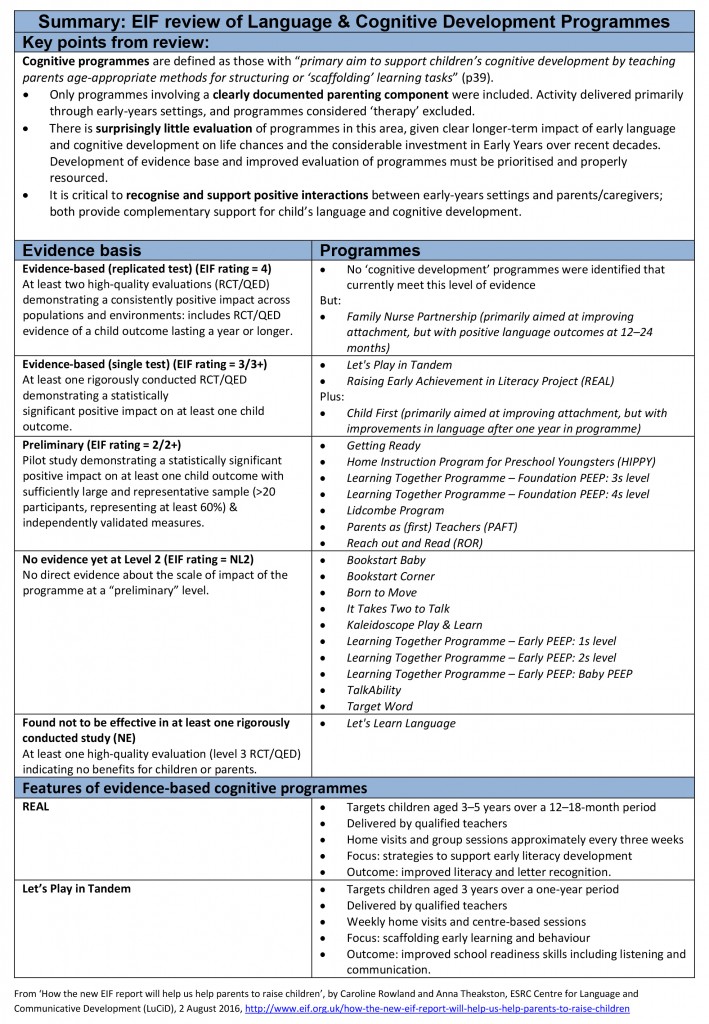Blog
How the new EIF report will help us help parents to raise children
Have you ever had that feeling of starting a task, expecting it to be easy, and then realising you have no idea what you’re doing? Being a parent is a lot like this. Helping your children learn and develop is a lot more complicated than it looks.
Take language learning. From the outside, it can seem like parents effortlessly and instinctively help their children learn to talk. But it’s a lot harder than it looks, and many parents struggle to create the rich language learning environment that children need. In fact, a large number of children in the UK start school without the language skills they need to understand even simple instructions (“Before you sit down, please hang up your coat”) and they definitely don’t have the building blocks that are so essential for learning to read and write. These children start off at a disadvantage and many never catch up. This has a knock-on effect on their education, their chances of going to university, their likelihood of getting a good job, and ultimately their adult quality of life.
EIF’s report, Foundations for Life: What works to support parent-child interaction in the early years, is going to help change that. It gives early-years teachers, health visitors, and health and education authorities the information they need to decide how best to support parents in raising their children. The report summarises and evaluates a wide range of intervention programmes that have been shown to help parents build strong relationships with their children, teach their children good behaviour, and boost their children’s language and communicative development.
Two things are groundbreaking in this report. The first is that EIF have focussed on programmes that are available in the UK. This means that the programmes they assess are largely ready and waiting for UK health and education practitioners to use. For example, the REAL programme (Raising Early Achievement in Literacy), which has a level 3 strength of evidence rating in the report (a good rating) can be accessed within seconds at the REAL website. So, with the right resources, practitioners could start to plan a REAL programme for their local area today.
The second is that EIF have worked hard to evaluate the programmes, applying robust but easy-to-follow evidence standards that will guide commissioners and practitioners towards the best programmes for them. Parenting programmes have often had a bad press – sometimes quite rightly, since they can be costly and very ineffective. Choosing the right programmes can be tricky. It’s not a good idea to choose an intervention programme like you might choose a holiday: because it has a convincing website, or because your friend recommended it. We should, instead, be choosing programmes in the same way that doctors choose which drug to prescribe: by checking whether there is clear, robust evidence that it will actually work, and by determining whether it is right for the person or population concerned.
We should be choosing programmes in the same way that doctors choose which drug to prescribe: by checking whether there is clear, robust evidence that it will actually work, and by determining whether it is right for the person or population concerned.
EIF has done this for us. As researchers who spend our working lives figuring out exactly how children learn to communicate, we’re particularly pleased that EIF has studied the evidence for 20 language and cognitive development programmes. We have summarised the details of these programmes in the table below (download PDF). EIF found two with good evidence, seven that are promising, and one that seemed to have no effect at all, at least in its current form. This isn’t many, but it’s enough to be going on with. Others may turn out to be effective, but at the moment we don’t have enough evidence to really tell.
We at LuCiD and other researchers must now work on improving the evidence base to give practitioners a wider range of robust, effective programmes to choose from. We are convinced that this is the most effective way to improve parenting and developmental outcomes and to make best use of the limited resources available.

